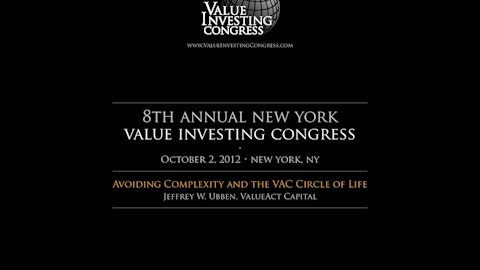According to a recent Form 4 filing with the Securities and Exchange Commission, Jeffrey Ubben’s ValueAct Capital has unloaded 1.69 million shares of Adobe Systems Incorporated (NASDAQ:ADBE) through three transactions at prices between $82.06 and $82.45 per share. ValueAct also reduced its stake in Adobe by 307,000 shares a few weeks ago, via another Form 4 filing (read more details). Consequently, the hedge fund currently owns a stake of 14.01 million shares valued at about $1.14 billion given the current price of $81.19 per share.

ValueAct Capital, one of the West Coast’s biggest hedge funds, was established by Jeffrey Ubben in June 2000. The investment management firm utilizes a friendly activist investing approach, unlike most of its peers in the industry, who pursue a confrontational approach. ValueAct’s investment strategy combines intensive due diligence along with active and constructive involvement with the board and management of different companies in value creation. Even though ValueAct Capital has been successful in most of its corporate overhauling endeavors, the fund will keep adhering to its core strategy of focusing primarily on mid-cap companies, so one should not expect that the fund will target ever-larger companies. Prior to launching his own shop, Jeffrey Ubben had acted as the Managing Partner at Richard Blum‘s Blum Capital Partners for more than five years. The San-Francisco-based hedge fund currently has over $18 billion in assets under management, while the value of its public equity portfolio amounts to $18.09 billion. The fund has delivered an average annualized return of 17% net-of-fees since its inception in 2000.
Follow Mason Morfit's ValueAct Capital
Following activist funds like Jeffrey Ubben’s is important because it is a very specific and focused strategy in which the investor doesn’t have to wait for catalysts to realize gains in the holding. A fund like ValueAct can simply create its own catalysts by pushing for them through negotiations with the company’s management and directors. In recent years, the average returns of activists’ hedge funds has been much higher than the returns of an average hedge fund. Furthermore, we believe do-it-yourself investors have an advantage over activist hedge fund investors because they don’t have to pay 2% of their assets and 20% of their gains every year to compensate hedge fund managers. We have found through extensive research that the top small-cap picks of hedge funds are also capable of generating high returns and built a system around this premise. In the 32 months since our small-cap strategy was launched it has returned over 139% and beaten the S&P 500 ETF (SPY) by more than 80 percentage points (read more details).
Adobe Systems Incorporated (NASDAQ:ADBE) is an American software company that offers products and services for creating, managing, delivering, optimizing, and engaging with content. The company has positioned itself as the global leader in digital marketing and digital media solutions. Adobe’s core revenue provider in its Digital Media business is the Adobe Creative Cloud offering. The company has embarked on a new transition to a fully-online distribution of its products since the launch of the Creative Cloud in May 2012. To be more detailed, the Creative Cloud is a subscription service that enables the company’s customers to download and install the up-to-date versions of Adobe’s products, which include Adobe Photoshop, Adobe Illustrator, Adobe Dreamweaver, and Adobe InDesign, to name just a few. Therefore, the transition to the cloud with a subscription pricing model has unlocked new revenue streams for the company. Specifically, the subscription pricing model lowered the entry price for its potential customers, while the attractive monthly pricing serves as the main stimulus of revenue growth for the company. Having said that, it is quite clear that Adobe’s transition has been very successful so far, but the market has certainly priced in the success of said transition.
Without further ado, we will take a look at Adobe’s recent financial results so as to understand the extent to which the success of the transition to a subscription model is reflected in its performance. Adobe reported a record quarterly revenue of $1.16 billion for its second fiscal quarter of 2015 that ended May 29, compared to a revenue figure of $1.07 billion reported in the same quarter a year ago. This is the first sign that the company has indeed been doing very well lately. Adobe’s Digital Media segment generated revenues of $747.48 million in the second fiscal quarter of this year, compared to $691.58 million reported in the second quarter of 2014. At the same time, the company’s Digital Marketing segment also generated higher revenues year-over-year, reaching a revenue figure of $366.46 million for the second quarter of 2015, compared to $330.36 million posted a year ago. Finally, Adobe’s diluted earnings per share was $0.29 on a GAAP-basis for the second fiscal quarter of this year, compared to $0.17 for the same quarter in 2014.
Even though Adobe has been doing great recently, with its shares increasing by nearly 13% year-to-date, one should not overlook the fact that Jeffrey Ubben has been gradually reducing his stake in the company. It might be the case that the company’s positive outlook has already been priced in, so there is not much upside potential for the company remaining. Only time will tell. Meanwhile, Stephen Mandel’s Lone Pine Capital is the second-largest shareholder of Adobe Systems Incorporated (NASDAQ:ADBE) within our database, tailing only Ubben’s ValueAct.
Disclosure: None


